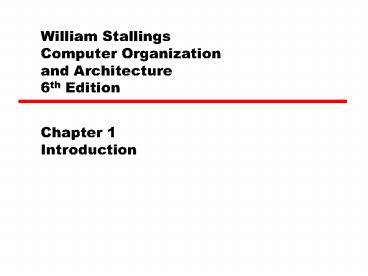William Stallings Computer Organization and Architecture 6th Edition - PowerPoint PPT Presentation
1 / 19
Title:
William Stallings Computer Organization and Architecture 6th Edition
Description:
William Stallings Computer Organization and Architecture 6th Edition Chapter 1 Introduction Architecture & Organization 1 Architecture is those attributes of a system ... – PowerPoint PPT presentation
Number of Views:346
Avg rating:3.0/5.0
Title: William Stallings Computer Organization and Architecture 6th Edition
1
William Stallings Computer Organization and
Architecture6th Edition
- Chapter 1Introduction
2
Architecture Organization 1
- Architecture is those attributes of a system
visible to the programmer - Instruction set, number of bits used for data
representation, I/O mechanisms, addressing
techniques. - e.g. Is there a multiply instruction?
- Organization is how features are implemented
- Refers to the operational units and their
interconnections that realize the architectural
specification. - Control signals, interfaces, memory technology.
- e.g. Is there a hardware multiply unit or is it
done by repeated addition?
3
Architecture Organization 2
- Many computer manufacturers offer a family of
computer models, all with the same architecture
but with differences in organization. - All Intel x86 family share the same basic
architecture - The IBM System/370 family share the same basic
architecture - This gives code compatibility
- Organization differs between different versions
4
Structure Function
- A hierarchical system is a set of interrelated
subsystems. - At each level, the system consists of a set of
components and their interrelationship. - The behaviour at each level depends only on a
simplified abstracted characterization of the
system at the next lower level. - At each, the designer is concerned with
- Structure is the way in which components relate
to each other - Function is the operation of individual
components as part of the structure
5
Structure Function
- Two descriptions
- Bottom-up
- Starting at the bottom and building up to a
complete description. - Top-down
- Beginning with a top view and decomposing the
system into its subparts. - The clearest and most effective.
6
Function
- All computer functions are
- Data processing
- Data storage
- Data movement
- Control
Functional view of a computer
7
Operations (1) Data movement
- Data movement
- e.g. keyboard to screen
8
Operations (2) Storage
- Storage
- Even if processing data on the fly
- e.g. Internet download to disk
9
Operation (3) Processing from/to storage
- Processing from/to storage
- e.g. updating bank statement
10
Operation (4)Processing from storage to I/O
- Processing from storage to I/O
- e.g. printing a bank statement
11
The Structure of Computer
- The computer interacts in some fashion with its
external environment. - Peripherals
- Communication lines
12
Structure - Top Level
Computer
Peripherals
Central Processing Unit
Main Memory
Computer
Systems Interconnection
Input Output
Communication lines
13
Structure - The CPU
CPU
Arithmetic and Login Unit
Computer
Registers
I/O
CPU
System Bus
Internal CPU Interconnection
Memory
Control Unit
14
Structure - The Control Unit
Control Unit
CPU
Sequencing Login
ALU
Control Unit
Internal Bus
Control Unit Registers and Decoders
Registers
Control Memory
15
Outline of the Book (1)
- Computer Evolution and Performance
- Computer Interconnection Structures
- Internal Memory
- External Memory
- Input/Output
- Operating Systems Support
- Computer Arithmetic
- Instruction Sets
16
Outline of the Book (2)
- CPU Structure and Function
- Reduced Instruction Set Computers
- Superscalar Processors
- Control Unit Operation
- Microprogrammed Control
- Multiprocessors and Vector Processing
- Digital Logic (Appendix)
17
Internet Resources- Web site for book
- http//WilliamStallings.com/COA6e.html
- links to sites of interest
- links to sites for courses that use the book
- errata list for book
- information on other books by W. Stallings
- http//WilliamStallings.com/StudentSupport.html
- Math
- How-to
- Research resources
- Misc
18
Internet Resources- Web sites to look for
- WWW Computer Architecture Home Page
- CPU Info Center
- ACM Special Interest Group on Computer
Architecture - IEEE Technical Committee on Computer Architecture
- Intel Technology Journal
- Manufacturers sites
- Intel, IBM, etc.
19
Internet Resources - Usenet News Groups
- comp.arch
- comp.arch.arithmetic
- comp.arch.storage
- comp.parallel































